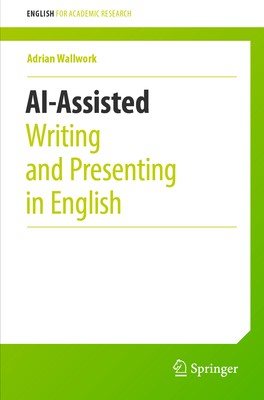
- We will send in 10–14 business days.
- Author: Adrian Wallwork
- Publisher: Springer
- ISBN-10: 3031481461
- ISBN-13: 9783031481468
- Format: 15.6 x 23.4 x 1.1 cm, softcover
- Language: English
- SAVE -10% with code: EXTRA
Reviews
Description
This book is part of the English for Academic Research series. It shows university students and researchers how to optimize their use of chatbots and machine translation to correct the English usage of a research paper, and write emails, letters, and presentation scripts and slides in English. English-speaking language editors, translators, and EAP teachers should also find this book useful.
The main focus is on ChatGPT and Google Translate. However the techniques proposed will also work with equivalent tools. You will learn the areas where ChatGPT works well: correcting, improving, paraphrasing, reducing, and summarizing texts; generating / suggesting texts, answering queries, and simulating academic scenarios.
The book lists over 100 prompts that you can use with a chatbot.
You will also be warned about what ChatGPT is currently NOT able to do, e.g. differentiating between 'essential' and 'non-essential'; listing all the changes it has made; highlighting your key findings; and advising you when you have written too much, plagiarized, used biased language, or forgotten to mention the limitations of your work.
You will learn strategies for massively improving the output of machine translation through pre-editing and post-editing your texts.
Adrian Wallwork edits scientific papers and teaches English for Academic Purposes (EAP) to PhD students. In addition to his many books for Springer, he has written course books for Oxford University Press and discussion books for Cambridge University Press. He is passionate about exploiting the advances in 2 artificial intelligence to help researchers around the world write and publish their work.
EXTRA 10 % discount with code: EXTRA
The promotion ends in 18d.09:13:54
The discount code is valid when purchasing from 10 €. Discounts do not stack.
- Author: Adrian Wallwork
- Publisher: Springer
- ISBN-10: 3031481461
- ISBN-13: 9783031481468
- Format: 15.6 x 23.4 x 1.1 cm, softcover
- Language: English English
This book is part of the English for Academic Research series. It shows university students and researchers how to optimize their use of chatbots and machine translation to correct the English usage of a research paper, and write emails, letters, and presentation scripts and slides in English. English-speaking language editors, translators, and EAP teachers should also find this book useful.
The main focus is on ChatGPT and Google Translate. However the techniques proposed will also work with equivalent tools. You will learn the areas where ChatGPT works well: correcting, improving, paraphrasing, reducing, and summarizing texts; generating / suggesting texts, answering queries, and simulating academic scenarios.
The book lists over 100 prompts that you can use with a chatbot.
You will also be warned about what ChatGPT is currently NOT able to do, e.g. differentiating between 'essential' and 'non-essential'; listing all the changes it has made; highlighting your key findings; and advising you when you have written too much, plagiarized, used biased language, or forgotten to mention the limitations of your work.
You will learn strategies for massively improving the output of machine translation through pre-editing and post-editing your texts.
Adrian Wallwork edits scientific papers and teaches English for Academic Purposes (EAP) to PhD students. In addition to his many books for Springer, he has written course books for Oxford University Press and discussion books for Cambridge University Press. He is passionate about exploiting the advances in 2 artificial intelligence to help researchers around the world write and publish their work.


Reviews